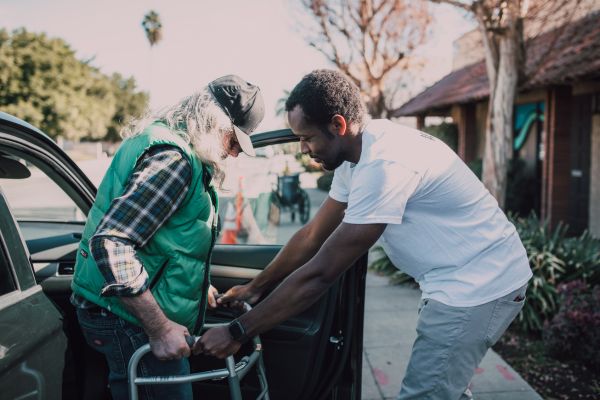Australia’s healthcare system is experiencing significant growth, creating numerous opportunities for international healthcare assistants seeking employment with visa sponsorship. The combination of an aging population, increased demand for healthcare services, and staff shortages has opened doors for qualified professionals from around the world to build rewarding careers in Australia.
Healthcare Assistant Jobs In Australia With Visa Sponsorship
This comprehensive guide explores the landscape of healthcare assistant positions across Australia, visa pathways, requirements for international applicants, and strategies for securing sponsorship. Whether you’re an experienced healthcare assistant or just beginning your career, this information will help you navigate the process of finding employment in Australia’s dynamic healthcare sector.
Understanding Healthcare Assistant Roles in Australia
Healthcare assistants in Australia work under various job titles, including personal care assistants, aged care workers, nursing assistants, and support workers. These professionals provide essential support to nurses, doctors, and other medical staff while delivering direct care to patients in diverse healthcare settings.
Common Workplace Settings
Healthcare assistants in Australia typically work in:
- Public and private hospitals
- Aged care facilities and nursing homes
- Disability support services
- Home care services
- Community health centers
- Rehabilitation facilities
- Mental health services
Key Responsibilities
The day-to-day duties of healthcare assistants vary depending on the specific role and workplace setting but generally include:
Assisting patients with personal care needs including bathing, dressing, and grooming Supporting patients with mobility and physical activities Monitoring and recording vital signs Assisting with medication administration under supervision Preparing and serving meals while adhering to dietary requirements Maintaining a clean and safe environment for patients Providing emotional support and companionship to patients Assisting with therapeutic activities and rehabilitation exercises Documenting patient information and reporting to nursing staff
Working Conditions
Healthcare assistant positions typically involve:
Shift work including evenings, weekends, and public holidays Physical demands such as lifting and transferring patients Emotional challenges when working with ill or vulnerable individuals Varying workloads depending on patient needs Team-based environments requiring strong communication skills Adherence to strict health and safety protocols Opportunities for career advancement through additional training
Qualification Requirements for Healthcare Assistants
To work as a healthcare assistant in Australia, international applicants must meet certain educational and certification requirements. These qualifications demonstrate your ability to provide safe and effective care while increasing your employability and chances of securing visa sponsorship.
Essential Qualifications
The minimum qualifications typically required include:
Certificate III in Individual Support (Aged Care) or equivalent Certificate III in Health Services Assistance Certificate IV in Aged Care or Disability First Aid and CPR certification
International qualifications may be recognized in Australia, but you might need to complete a skills assessment through a relevant authority. The Australian Government’s Department of Education, Skills and Employment provides resources for having overseas qualifications recognized.
Additional Valuable Certifications
While not always mandatory, these additional qualifications can enhance your employment prospects:
Certificate IV in Disability Support Medication administration certification Dementia care specialization Palliative care training Manual handling certification Infection control training
Language Requirements
Strong English language skills are essential for healthcare roles in Australia. Most visa applications and many employers require proof of English proficiency through tests such as:
International English Language Testing System (IELTS) Occupational English Test (OET) Test of English as a Foreign Language (TOEFL) Pearson Test of English (PTE)
For most healthcare positions, you’ll need to achieve at least a competent level on these tests, though specific score requirements vary depending on the visa type and employer.
Visa Options for Healthcare Assistants
Several visa pathways enable international healthcare assistants to work in Australia. Each option has specific eligibility criteria, application processes, and benefits. Understanding these pathways will help you determine the most suitable route for your circumstances.
Temporary Skill Shortage (TSS) Visa (Subclass 482)
This visa allows skilled workers to come to Australia to work for an approved sponsor in response to labor market shortages. For healthcare assistants:
Requires employer sponsorship Available in short-term (up to 2 years) or medium-term (up to 4 years) streams Requires relevant work experience and qualifications Allows holders to bring eligible family members May provide a pathway to permanent residency for medium-term stream applicants
Skilled Independent Visa (Subclass 189)
This points-based visa allows skilled workers to live and work permanently in Australia:
Does not require employer sponsorship Requires nomination of an occupation on the relevant skilled occupation list Requires positive skills assessment Requires minimum points score (currently 65 points) Points awarded for age, English proficiency, work experience, and qualifications
Skilled Nominated Visa (Subclass 190)
Similar to the Skilled Independent Visa but requires nomination by a state or territory government:
Provides permanent residency Requires nomination by a state or territory government Additional 5 points awarded for state nomination May have lower points threshold than the independent stream May require commitment to live and work in the nominating state
Regional Sponsored Migration Scheme (Subclass 187)
This visa is designed to help regional Australian employers sponsor skilled workers:
Requires employer sponsorship in a regional area provides a pathway to permanent residency May have less stringent requirements than metropolitan positions Requires commitment to work in a regional area for a specified period
Working Holiday Visa (Subclass 417) or Work and Holiday Visa (Subclass 462)
While not specifically designed for healthcare roles, these visas can provide an entry point:
Available to eligible applicants aged 18-30 (or 35 for some countries) Allows work for up to 6 months with one employer Can be extended through specified work in regional areas Provides an opportunity to gain Australian work experience May lead to employer sponsorship for longer-term visas
Current Demand for Healthcare Assistants in Australia
Australia’s healthcare sector continues to experience significant growth, creating substantial demand for healthcare assistants across various specializations. Understanding where the greatest needs exist can help you target your job search effectively.
High-Demand Regions
While opportunities exist throughout Australia, certain regions have particularly high demand:
Regional and rural areas frequently experience severe staffing shortages and offer incentives for healthcare workers Queensland’s growing population has increased demand for healthcare services Victoria’s aged care sector continues to expand rapidly Western Australia’s remote communities offer unique opportunities with attractive compensation packages Tasmania has an aging population creating increased demand for aged care workers Northern Territory offers unique experiences working with Indigenous communities
In-Demand Specializations
Certain specializations within the healthcare assistant field are particularly sought after:
Aged care specialists as Australia addresses its aging population Disability support workers with NDIS (National Disability Insurance Scheme) growth Mental health support workers due to expanding mental health services Palliative care assistants as end-of-life care services develop Home care specialists supporting the trend toward aging in place Rehabilitation assistants supporting recovery from illness and injury
Growth Projections
According to the Australian Government’s Job Outlook, employment in healthcare support roles is projected to grow significantly over the next five years. The aged care sector alone is expected to require an additional 50,000 workers by 2025 to meet demand.
Finding Employers Offering Visa Sponsorship
Securing an employer willing to provide visa sponsorship is often the most challenging aspect of obtaining a healthcare assistant position in Australia. However, several strategies can increase your chances of success.
Types of Employers Offering Sponsorship
These organizations are more likely to sponsor healthcare assistants:
Large healthcare networks and hospital systems Aged care facility chains with multiple locations Disability service providers operating under the NDIS Healthcare recruitment agencies specializing in international placement Government health services in regional and remote areas Private healthcare companies with established sponsorship programs
Job Search Strategies
Effective approaches to finding sponsorship opportunities include:
Specialized job boards featuring visa-sponsored positions Recruitment agencies focusing on healthcare placements Direct applications to large healthcare providers Networking with healthcare professionals already working in Australia Industry conferences and virtual recruitment events Professional association job boards and resources LinkedIn searches using relevant terms like “visa sponsorship” and “healthcare assistant”
Timing Your Application
Understanding the best timing for applications can increase success:
Many employers recruit during Australia’s financial year transition (May-July) Regional facilities often have urgent needs due to staff shortages Applications timed before major policy changes to immigration rules Seasonal variations in staffing needs, particularly during holiday periods
Preparing a Competitive Application
Creating a standout application is essential when seeking visa sponsorship as competition can be intense. Your application must demonstrate not only your qualifications but also your unique value to potential employers.
Resume/CV Customization
Tailor your resume specifically for Australian healthcare employers:
Use Australian terminology (e.g., “aged care” rather than “elder care”) Highlight qualifications relevant to Australian standards Emphasize experience with clinical systems used in Australia Include relevant certifications and continuing education Quantify achievements with specific metrics when possible Address any gaps in employment history proactively Include professional references with international perspective
Cover Letter Essentials
Your cover letter should:
Explain your motivation for working in Australia specifically Address your eligibility for visa sponsorship Demonstrate knowledge of the Australian healthcare system Highlight specialized skills relevant to the specific role Show commitment to continuing professional development Express willingness to adapt to Australian workplace culture Acknowledge the investment the employer is making in sponsoring you
Interview Preparation
If you secure an interview, prepare to address:
Specific questions about visa eligibility and requirements Scenarios demonstrating cultural adaptability Clinical scenarios relevant to Australian healthcare contexts Questions about long-term career goals in Australia Practical demonstrations of key skills for the role Discussion of any additional training you’re willing to undertake
Understanding Employer Sponsorship Requirements
Employers must meet specific criteria to sponsor international healthcare assistants. Understanding these requirements will help you identify suitable employers and navigate the sponsorship process effectively.
Employer Eligibility Criteria
To sponsor healthcare assistants, employers must:
Be an approved sponsor with the Department of Home Affairs Demonstrate inability to fill positions with local workers Comply with Australian workplace laws and agreements Have financial capacity to support sponsored employees Maintain appropriate records and reporting mechanisms Meet training benchmarks for Australian workers Provide equivalent pay and conditions to Australian workers
Employer Costs and Commitments
Employers considering sponsorship must account for:
Sponsorship application fees (several thousand dollars) Nomination fees for each position Potential migration agent fees Administrative costs for processing and compliance Training costs for new international staff Potentially higher salaries to meet minimum income thresholds Ongoing compliance obligations
Negotiating Sponsorship
When discussing sponsorship with potential employers:
Understand which costs the employer will cover versus your responsibility Clarify contract length and post-sponsorship obligations Discuss relocation assistance and settlement support Address professional development opportunities Inquire about pathways to permanent residency Establish clear expectations about work hours and conditions Determine what happens if the position doesn’t work out
The Visa Application Process
Once you’ve secured an employer willing to provide sponsorship, you’ll need to navigate the visa application process. This section outlines the key steps and considerations.
Step-by-Step Application Guide
The typical process involves:
Employer becomes an approved sponsor (if not already) Employer nominates your position for sponsorship You receive invitation to apply for the relevant visa You submit a complete visa application with supporting documentation Health and character assessments are conducted Visa decision is made by the Department of Home Affairs If approved, visa is granted with specific conditions and validity period
Documentation Requirements
Be prepared to provide:
Passport and identity documents Qualification certificates and transcripts Skills assessment results (if applicable) English language test results Employment references and resume Police clearances from all countries of residence Medical examination results Proof of health insurance coverage Financial statements showing ability to support yourself initially
Timeline Considerations
The visa application process timeline varies based on:
Visa subclass and priority processing Completeness of your application Current processing backlog at the Department of Home Affairs Any requests for additional information Complexity of your individual circumstances Seasonal fluctuations in application volumes
Most work visa applications take between 3-12 months to process, though this can vary significantly. Planning ahead and ensuring all documentation is complete can help minimize delays.
Settlement and Transition to Australia
Successfully obtaining a visa is just the beginning of your journey. Planning for your transition to Australia requires careful consideration of practical matters to ensure a smooth settlement experience.
Initial Arrival Planning
Before departing for Australia, arrange:
Temporary accommodation for your first few weeks Transport from the airport to your accommodation Initial funds for settling in (experts recommend at least AUD 5,000) Essential items and clothing appropriate for the climate Documentation organized in a secure but accessible way Australian SIM card or international roaming for your phone Confirmation of your start date and location with your employer
Housing Options
Consider these accommodation approaches:
Short-term serviced apartments while searching for permanent housing Shared accommodation to reduce costs initially Rental properties near your workplace to minimize commuting Company housing if offered by your employer Regional housing options which may be more affordable than cities Understanding rental application processes and requirements Budgeting for bond payments (typically four weeks’ rent)
Financial Considerations
Prepare for these financial aspects:
Opening an Australian bank account (possible before arrival) Understanding Australian tax requirements and applying for a Tax File Number Setting up superannuation (retirement) accounts Arranging health insurance coverage Budgeting for higher initial expenses during settlement Understanding exchange rates and international transfer fees Planning for potential gaps between arrival and first paycheck
Cultural Adaptation
Adjust to Australian workplace culture by:
Understanding Australian communication styles, which tend to be direct but friendly Learning about appropriate workplace etiquette and expectations Familiarizing yourself with Australian slang and terminology Recognizing the value placed on work-life balance Participating in team social activities when invited Being open to different clinical practices and protocols Asking questions when unsure rather than making assumptions
Specialized Healthcare Assistant Roles
The healthcare assistant field encompasses various specialized roles, each with unique responsibilities and employment prospects. Understanding these specializations can help you target positions aligned with your skills and interests.
Aged Care Assistants
Working primarily in residential facilities or home care settings:
Focus on supporting elderly individuals with daily living activities Often work with patients experiencing dementia or other age-related conditions May assist with mobility, hygiene, medication, and social engagement Growing demand due to Australia’s aging population Opportunities for specialization in dementia care or palliative support Potential for career advancement to team leader or care coordinator roles
Disability Support Workers
Supporting individuals with physical, intellectual, or developmental disabilities:
Assist clients with personal care, community access, and skill development Work in residential facilities, client homes, or community settings Often develop long-term relationships with clients Expanding opportunities through the National Disability Insurance Scheme Requires strong advocacy skills and person-centered approach Potential specialization in specific disability types or support needs
Hospital Ward Assistants
Working in acute care settings under nursing supervision:
Support nursing staff with non-clinical tasks Assist patients with mobility and personal care Maintain stock levels and prepare equipment Transport patients between departments Maintain clean and safe environments Often work rotating shifts including nights and weekends Exposure to diverse medical situations and specialties
Mental Health Support Workers
Assisting in mental health facilities or community programs:
Support individuals experiencing mental health challenges Assist with daily living activities and community engagement Implement aspects of care plans under professional supervision Provide emotional support and encourage recovery-oriented practices Maintain safe environments and assist with crisis prevention Growing sector with increased government funding Requires additional training in mental health first aid and recovery approaches
Professional Development and Career Advancement
Working as a healthcare assistant in Australia can be a stepping stone to broader career opportunities within the healthcare sector. Understanding potential pathways for advancement can help you plan your long-term career strategy.
Education Pathways
Further education options include:
Certificate IV in Aged Care or Disability for advanced roles Diploma of Nursing leading to Enrolled Nurse qualification Bachelor of Nursing pathway to Registered Nurse status Specialized certifications in areas like dementia care, wound management, or palliative care Recognition of Prior Learning (RPL) to credit existing knowledge toward qualifications Part-time study options while maintaining employment
Career Progression Routes
Common advancement paths include:
Team leader or supervisor roles overseeing other healthcare assistants Specialized care coordinator positions focusing on specific patient groups Case management roles in aged care or disability services Training and assessment positions teaching new healthcare assistants Quality assurance roles ensuring compliance with care standards Transition to administrative or management positions within healthcare Diversification into allied health assistance roles with additional training
Professional Development Resources
Valuable resources for ongoing learning include:
Industry associations offering continuing education and networking Government-subsidized training programs for healthcare workers Employer-sponsored professional development opportunities Online courses focused on healthcare skills and knowledge Conferences and workshops addressing current best practices Mentorship programs connecting with experienced professionals Subscriptions to relevant healthcare publications and research
Understanding Australian Healthcare Systems
Familiarity with Australia’s healthcare structure will help you integrate more effectively into your new workplace and understand the broader context of your role.
Public vs. Private Healthcare
Australia operates a mixed healthcare system:
Medicare provides universal public healthcare coverage Public hospitals offer free treatment for Australian citizens and some visa holders Private hospitals and clinics operate alongside the public system Private health insurance provides additional coverage and choice Many healthcare assistants work across both public and private sectors Understanding the funding models affects documentation requirements
Regulatory Frameworks
Healthcare practice in Australia is governed by:
Aged Care Quality and Safety Commission for aged care services NDIS Quality and Safeguards Commission for disability services Australian Health Practitioner Regulation Agency for regulated health professions State and territory health departments for regional regulations Workplace health and safety legislation Privacy and confidentiality requirements under Australian law Mandatory reporting obligations for suspected abuse or neglect
Cultural Considerations
Australia’s diverse population requires cultural awareness:
Indigenous health considerations and culturally safe practices Multicultural patient populations with diverse needs and expectations Religious and cultural preferences affecting care delivery Language barriers and working with interpreters Recognition of diverse family structures and decision-making processes Cultural significance of health, illness, and care practices
Challenges and How to Overcome Them
International healthcare assistants often face specific challenges when transitioning to work in Australia. Being prepared for these challenges can help you navigate them successfully.
Common Obstacles
Typical challenges include:
Delays in visa processing affecting employment timelines Difficulty finding employers willing to sponsor first-time applicants Adjusting to Australian clinical terminology and practices Recognition of international qualifications and experience Building professional networks in a new country Managing homesickness and cultural adjustment Navigating housing markets in high-demand areas Understanding Australian workplace culture and communication styles
Practical Solutions
Effective strategies to address these challenges:
Start the visa application process well in advance of planned relocation Consider regional placements where sponsorship may be more accessible Engage with online communities of healthcare workers in Australia Seek mentorship from professionals who have made similar transitions Participate in cultural orientation programs if available Maintain connections with home while building new social networks Accept that adjustment takes time and be patient with yourself Take advantage of employer support programs when offered
Support Resources
Valuable support services include:
Migration agents specializing in healthcare placements Settlement services provided by community organizations Professional associations offering networking opportunities Online forums connecting international healthcare workers Cultural orientation programs offered by employers or communities Mental health support services for adjustment challenges Financial counseling for managing relocation expenses
Financial Considerations
Working as a healthcare assistant in Australia involves various financial aspects that differ from other countries. Understanding these considerations helps you plan effectively and maximize your earning potential.
Salary Expectations
Healthcare assistant salaries vary based on:
Position level and responsibilities Geographic location (metropolitan vs. regional) Type of facility or service provider Shift patterns (including penalty rates for evenings/weekends) Qualification level and specialized skills Length of experience in the field Enterprise agreements or awards governing the workplace
As of 2023, entry-level healthcare assistants typically earn between AUD 50,000-60,000 annually, with experienced specialists earning AUD 65,000-75,000 or more. Regional positions often offer higher salaries to attract qualified staff.
Tax Obligations
Important tax considerations include:
Obtaining a Tax File Number (TFN) upon arrival Understanding tax residency status and implications Income tax rates ranging from 0% to 45% depending on income level Medicare levy of 2% (applicable to some visa holders) Potential tax deductions for work-related expenses Superannuation (retirement) contributions of at least 11.5% paid by employer Tax treaties between Australia and your home country affecting obligations
Cost of Living
Budget planning should account for:
Housing costs varying significantly between cities and regions Utilities including electricity, water, and internet Transportation expenses for commuting Food and grocery costs Healthcare expenses not covered by insurance Communication services including mobile phone plans Professional registration and continuing education fees Regular remittances to family in home country if applicable
Banking and Financial Services
Essential financial setup includes:
Opening an Australian bank account (possible before arrival) Setting up direct deposit for salary payments Understanding banking fees and services Establishing emergency savings for unexpected expenses Researching the most cost-effective methods for international transfers Obtaining appropriate insurance coverage (health, home contents, etc.) Planning for retirement through superannuation management
Success Stories and Case Studies
Learning from others who have successfully navigated the path to working as a healthcare assistant in Australia can provide valuable insights and inspiration.
Maria’s Journey: From Philippines to Queensland
Maria, a healthcare assistant from the Philippines, secured sponsorship with an aged care provider in regional Queensland:
Completed Certificate III in Individual Support through an Australian RTO’s offshore program Applied directly to facilities in regional areas facing staffing shortages Secured sponsorship after three months of applications and interviews Navigated the TSS visa process with employer support Initially committed to a two-year contract in a regional facility Successfully transitioned to permanent residency after completing regional work requirements Now works as a team leader supervising other healthcare assistants Credits success to willingness to work in regional areas and specialized dementia care training
Raj’s Experience: Career Change to Healthcare
Raj transitioned from hospitality to healthcare after moving to Australia:
Initially arrived on a Working Holiday Visa and worked in hospitality Completed Certificate III in Individual Support while on temporary visa Networked with healthcare providers during clinical placement Impressed employer enough to offer sponsorship upon qualification Successfully transitioned to a TSS visa Currently working in disability support while studying for nursing qualification Recommends starting with agency work to gain exposure to different facilities
Susan’s Pathway: From UK to Specialist Role
Susan, an experienced healthcare assistant from the UK, leveraged her specialized skills:
Had extensive experience in palliative care in the UK Applied for skills assessment to validate international experience Targeted employers specializing in end-of-life care Secured sponsorship with a private hospital’s palliative care unit Negotiated relocation assistance as part of employment package Successfully integrated specialized UK training with Australian practices Now provides training to other staff in palliative approaches Recommends highlighting specialized skills that address specific employer needs
Frequently Asked Questions
This section addresses common questions from international healthcare assistants considering work in Australia.
Visa and Immigration Questions
Q: Can healthcare assistants qualify for permanent residency in Australia? A: Yes, healthcare assistants may qualify for permanent residency through employer nomination schemes, skilled migration pathways, or after a period on a temporary visa. The specific options depend on your qualifications, experience, and employer support.
Q: Do I need to have my qualifications assessed before applying for a visa? A: While not always mandatory for healthcare assistants, a skills assessment can strengthen your application and may be required for certain visa subclasses. Check the specific requirements for your intended visa pathway.
Q: Can my family members join me in Australia? A: Most work visas allow you to include eligible family members in your application, including partners, dependent children, and in some cases, other relatives. Family members generally receive the same visa conditions regarding work and study rights.
Employment Questions
Q: How long does it typically take to find a sponsored position? A: Timeframes vary widely depending on your qualifications, experience, and target location. Some applicants secure positions within weeks, while others may search for 6-12 months. Regional positions are often filled more quickly than metropolitan roles.
Q: Are healthcare assistant qualifications from other countries recognized in Australia? A: International qualifications may be recognized, but you might need to complete a skills assessment or bridging training. Some employers prefer candidates with Australian qualifications, particularly the Certificate III in Individual Support.
Q: What are the typical working hours for healthcare assistants? A: Healthcare assistants usually work on a shift basis, including mornings, afternoons, nights, weekends, and public holidays. Full-time employees typically work 38 hours per week, often in 8 or 12-hour shifts.
Living in Australia Questions
Q: What is the work-life balance like for healthcare assistants in Australia? A: Australia generally emphasizes work-life balance more than many other countries. Healthcare assistants typically receive 4 weeks of annual leave, personal/sick leave entitlements, and penalty rates for weekend and holiday work.
Q: How do I find accommodation in Australia? A: Common methods include online rental platforms like Domain and realestate.com.au, real estate agencies, and social media groups. Some employers offer temporary accommodation or assistance with finding housing, particularly in regional areas.
Q: What support services are available for new migrants working in healthcare? A: Support services include settlement programs offered by the Department of Home Affairs, professional associations for healthcare workers, cultural groups, employer assistance programs, and community organizations supporting migrants in specific regions.
Conclusion
Australia offers exceptional opportunities for international healthcare assistants seeking to advance their careers while experiencing life in a new country. The combination of high demand for skilled healthcare workers, competitive salaries, and potential pathways to permanent residency makes Australia an attractive destination for healthcare professionals globally.
Success in securing a healthcare assistant position with visa sponsorship requires careful planning, thorough research, and strategic application approaches. By understanding the Australian healthcare system, visa requirements, and employer expectations, you can position yourself as a valuable addition to Australia’s healthcare workforce.
While the process may seem complex, thousands of international healthcare assistants have successfully made the transition to working and living in Australia. With dedication, persistence, and the information provided in this guide, you can join them in building a rewarding healthcare career in Australia.
Remember that the journey to working in Australia is unique for each individual. Remaining flexible, maintaining a positive attitude, and being willing to consider diverse opportunities will maximize your chances of success. As Australia’s healthcare needs continue to grow, the prospects for skilled and committed healthcare assistants will only expand in the coming years.







